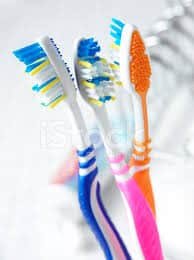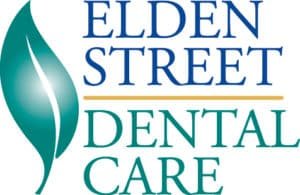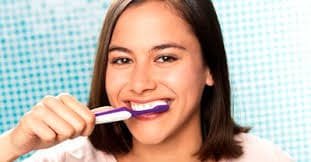A: You Don’t.
(You only have to brush the ones you want to keep!)
Great Falls, VA
It might seem like an inconvenient chore, but brushing your teeth is THE most important thing you can do for your dental health. But how much brushing is enough?
Some is better than none, so even if you’re not brushing the recommended two times daily, at least you’re trying (or are you?). But consider what happens when you don’t — then you’ll realize why brushing regularly, and properly, matters so much.
Brushing your teeth plays an important role in keeping your mouth and teeth healthy, as well as the rest of your body. We brush, floss, and rinse repeatedly every day to avoid bad breath, and to remove stains and food particles. But the bottom line, bare bones, one ultimate reason: TO REDUCE THE BACTERIAL LOAD IN THE MOUTH AND PREVENT PERIODONTAL DISEASE!

When the biofilm (a thin, slimy layer of bacteria) in your mouth is not brushed away, periodontal pathogens start piling on your teeth. In approximately 3-12 weeks, they will become the predominant species in your oral tissues, surrounding the gums.
The primary reason for repetitive daily home care has to do with the properties of biofilm formation. Since the early colonizers are not pathogenic, and cannot cause periodontitis, you want to have these in place as often as possible. You want the virulent, disease-causing periodontal pathogens to be in the non-attached, free-floating position so they can be easily brushed away.
So, on a clinical level, how do you maximize the favorable, early colonizers and minimize the later-colonizing periodontal pathogens? You do this by forcing the biofilm to keep starting over. And you accomplish this by removing it as often as possible…in the form of brushing your teeth!
Every time you knock down the biofilm with your home-care efforts, you make it start over. Every time it starts over, the early bugs are the same favorable, non disease-causing ones — and they cannot cause periodontitis, ever.
The ultimate reason for brushing twice a day is to keep making the biofilm start over and over and over, because every time it starts over, we have just the early-arriving good bacteria. Frequent, effective home care is critically important, since periodontal disease causes tooth loss and affects the rest of the body. Failure to prevent periodontitis development condemns you to a lifetime of disease management and health issues including heart disease, diabetes, Alzheimer’s, and cancer.
5 Facts You Should Know About Brushing Your Teeth…
Brushing your teeth does not end with simply following a brushing schedule and oral hygiene routine. There are many things to consider that will make your tooth brushing more effective:
- There is a right toothbrush for you – Do you find brushing is physically uncomfortable? You might wonder how there could be a toothbrush perfect for you when they all seem to function the same way. And with so many choices, choosing the right one can seem overwhelming. But there is a way to pick the right toothbrush for you and your mouth.

One of the most important things to consider is the size of your mouth. If it’s smaller than most, make sure to pick a toothbrush with a head that can easily fit into every corner of your mouth. And the softer the bristles, the better! Soft bristles clean more effectively and gently, while hard bristles can wear down your tooth structure and cause your gums to bleed and recede.
- There is a proper way of brushing your teeth – Even if you brush your teeth twice daily, it sometimes isn’t enough to keep your teeth healthy, especially if you aren’t doing it the right way. There are 3 important steps you should keep in mind when brushing your teeth:
- Put the right amount of toothpaste on your toothbrush. A pea-sized amount of toothpaste is all you need. Aim to place your toothbrush at a 45 degree angle towards your gum line.
- Start by moving in gentle, circular motions on your upper and lower teeth, repeating on the inside and outside surfaces. After, clean the chewing surfaces by doing a light back and forth stroke. Don’t forget to gently brush your tongue too, in order to remove bacteria and freshen your breath.
- Brushing your teeth should last 2-3 minutes to effectively remove the bacteria and plaque that stick to them. Most opt to rinse after spitting out the toothpaste, but recent studies suggest that it is more beneficial to avoid rinsing after brushing. People who do have a lower risk of developing cavities as the fluoride in the paste remains on the teeth’s surface, thus protecting it from decay.
- Your toothbrush has an expiration date – How often do you change your toothbrush? If you can’t remember, then maybe it’s been too long.
Don’t expect an old toothbrush to be as effective as a new one! The ability of your toothbrush to reach small crevices decreases as its bristles wear down and should be replaced every 3-4 months, or as soon as you notice that the bristles begin to turn in different directions or have lost their original shape.
Bacterial and viral infections that are embedded in the bristles are yet another reason to switch out an old toothbrush for another one.
- Flossing your teeth is a must – Do you floss? Or, like many others, do you always find a reason not to? Flossing is even more important than brushing when it comes to preventing periodontal (gum) disease and tooth loss.
The trick to flossing, for many, is simply picking up the floss and starting. So why isn’t it that simple? Everyone has their list of excuses. However, with a little work, they can all be overcome. For some, flossing can be surprisingly complicated. It seems simple in concept, but when you actually do it, it’s all-too-easy to feel like you’re going about it all wrong. If you just hate string floss, there are several good alternatives. Floss picks are single-use, disposable plastic devices that hold a bit of pre-threaded floss between two prongs on one end with a pick on the other. Some have a flat design and others are Y-shaped, but they both do the job.
It doesn’t matter whether you use floss before or after your brush your teeth, as long as you do it at least once a day.
- Fluoride toothpaste is a good choice – Since the time of the ancient Egyptians, people have used mixtures of various substances in pursuit of a single goal: cleaning their teeth effectively. Today, with so many brands of toothpaste on the supermarket shelf, most people seem to have a particular favorite. Whichever you choose, make sure it has one key ingredient: FLOURIDE.
Flouride helps strengthen enamel and prevent tooth decay by making teeth more resistant to acid attack (which precipitates tooth decay). It was first introduced into toothpaste formulations in 1914. In fact, it’s arguably the most important ingredient, and no toothpaste can receive the American Dental Association’s Seal of Approval without it.
Knowing how to take care of your teeth is one thing, but actually doing it is another. In the end, only you can decide how and when to brush. And if you decide to brush less than twice a day, it’s even more important to be sure you see Dr. Queen on a regular basis. We recommend everyone visits us at least twice a year so we can spot and prevent tooth and gum problems before they become much larger issues.

